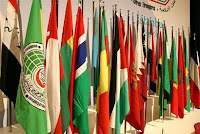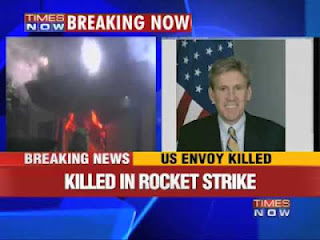Mayhem at Karachi
It seems that certain forces are adamant at plunging
Karachi completing into anarchy. At an average nearly 15 people are being
killed on daily basis over the last three months. Among the killed are
political activist and members of religious parties but the largest number
pertain to Shia and Sunni sects. Instead of rounding up the killers, those
responsible out all the blame on ‘third hand’. Earlier the hype was created
that Taliban were entering Karachi to get it free from the ‘hostage’ of MQM’. Till recently targeted killing was common but now funeral processions are also being
attacked. Added to these are blockade of roads by the agitators, putting up
public and private properties on fire. The most criminal is the silence of
coalition partners and the propaganda that booty collectors have also entered
Punjab.
There is growing consensus among the people belonging to
different sects and political affiliations that ‘mercenaries’ have thronged
Karachi with a clear mandate to plunge the city into complete anarchy. They
know very well that Karachi is the lifeline of Pakistan and hub of industrial
and commercial activities. Therefore, without cutting this lifeline the
ultimate objective of fragmenting Pakistan can’t be achieved. It is on record
that people belonging to all the cast and creed, political and religious sects
are being killed, shops and commercial areas are closed and private and public
and private properties are reduced to ash.
Ironically, the three coalition partners PPP, ANP and MQM
are trying to buyout sympathies because their members are being assassinated
but have been failing miserably in restoring peace despite being in power for
years. This force the people to infer that some ‘supra power’ controls the
tentacles and before it coalition partners are also helpless. There is also a
growing realization that the mercenaries have also crept into law enforcing
agencies. This impression develops because none of the perpetrators has been
rounded up and given punishment. The most glaring examples are killing of
Benazir Bhutto and her brother and famous political and religious leaders.
If one also adds to this burning of more than 300 workers
of ill-fated garment factory, blasts at mosques and religious gathering and
attack at Rangers Headquarters only one point is evident, the killers and
perpetrators are far stronger than the law enforcing agencies. One of the
conspiracy theories is that services of trained security personnel are being
hired to create the mess. It is also feared that personnel of investing
agencies are also being paid lavishly on not arresting the criminals, collect
evidence against them and when they some of the criminals are presented before
the courts; they are acquitted because of lack of sufficient evidence.
Some of the critics say that all and sundry know the
gangs and their leaders involved in killing, blasting bombs and putting private
and public properties at fire. The names and faces of booty collectors and
their godfathers are known to all. However, the government puts the blame on
‘third hand’. It may be said that it is the only hand because all others have
been cut or tied. Now people openly say that don’t look at the getup of people
which is completely disguising, these are cold-blooded mercenaries and their
sole objective is to destroy Pakistan. The perpetrators know very well that
Karachi is the safest heaven because of concentration of linguistic and
sectarian groups. They also say that the residents are being used as human
shields.
Courtesy: The Financial Daily






